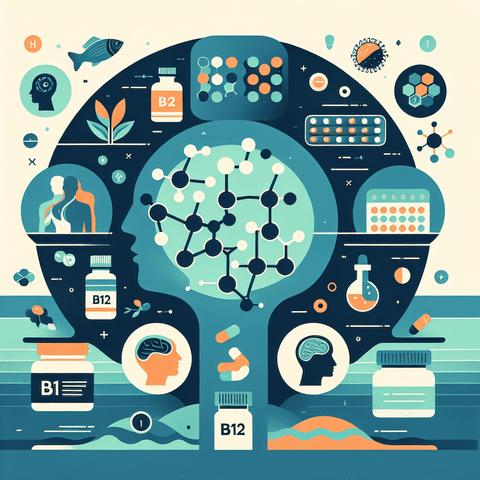Understanding B12 Deficiency in the Context of Nutritional Supplements
Vitamin B12, scientifically known as cobalamin, is an essential micronutrient that plays a fundamental role in numerous physiological processes. It is vital for the synthesis of red blood cells, DNA production, the function of the nervous system, and energy metabolism. Because the body cannot produce Vitamin B12 on its own, adequate intake through food or nutritional supplements is necessary. This water-soluble vitamin is largely found in animal-based products such as meat, eggs, dairy, and certain types of fish, making individuals following vegetarian or vegan diets more susceptible to deficiency.
There are several reasons someone may develop a B12 deficiency. These include dietary restrictions (e.g., veganism), gastrointestinal disorders (like Crohn’s disease, celiac disease, or atrophic gastritis), surgical removal of parts of the stomach or small intestine (e.g., gastric bypass surgery), and conditions such as pernicious anemia which impair the body’s ability to absorb B12. The prolonged use of certain medications, such as metformin or proton-pump inhibitors, can also interfere with B12 absorption. Additionally, as people age, their bodies often become less efficient at absorbing this nutrient from food due to lower stomach acid production.
Without sufficient levels of vitamin B12, the body experiences a range of metabolic and neurological disruptions. These consequences can develop subtly and gradually, making early detection critical. Left untreated, a B12 deficiency can result in permanent damage to the nervous system and an increased risk of cardiovascular and cognitive disorders. In this context, nutritional supplements play a key role in prevention and treatment, especially for at-risk populations. High-quality B-complex vitamins or specific B12 formulations (such as methylcobalamin or cyanocobalamin) are often used to bridge the dietary gap and mitigate risks.
Maintaining awareness of the causes and consequences of B12 deficiency allows for timely intervention. By understanding your individual risk factors and considering routine blood level checks, particularly if you're in a vulnerable group, you can avoid complications associated with delayed treatment. Moreover, nutritional guidance that includes the use of dietary supplements offers a practical solution for maintaining optimal B12 levels.
Early Symptoms of B12 Deficiency: Recognizing the First Signs
Recognizing the early signs of vitamin B12 deficiency is key to ensuring swift intervention and effective treatment. Initially, deficiency symptoms can be subtle and mimic other common conditions, delaying diagnosis and making it important to understand what to look for when deficiency is suspected. Among the earliest and most telling symptoms is fatigue. If you find yourself feeling unusually tired after moderate activity or consistently lacking energy despite good sleep and nutrition, it may be your body's response to low levels of red blood cells caused by insufficient B12. This form of anemia limits the oxygen supply to tissues, triggering feelings of exhaustion and weakness.
Neurological symptoms can also present in the early stages and are among the most alarming indicators of deficiency. Individuals may begin to notice a tingling sensation or “pins and needles” feeling in the hands and feet, medically referred to as peripheral neuropathy. These tingling sensations arise due to B12’s role in myelin synthesis, a fatty substance that protects and insulates nerves. A deficiency leads to damage in the nerves, affecting tactile sensation and motor function.
Mental and cognitive changes may also appear early in a B12-deficient state. Difficulties concentrating, memory lapses, or cognitive fog are symptoms that some individuals report before any hematological or physical indicators emerge. This is especially dangerous because such cognitive impairments may be mistakenly attributed to stress or aging. Additionally, mood disturbances such as irritability, anxiety, and even depression have been observed in individuals with B12 deficiency. These symptoms are likely connected to B12's involvement in synthesizing serotonin and dopamine—neurotransmitters crucial for mood regulation.
Another profound but often overlooked sign is changes in skin appearance. A person may develop pale or jaundiced skin due to the breakdown of red blood cells, leading to an excess of bilirubin in the body. This gives the skin a yellowish tint, which is sometimes mistaken for other illnesses such as liver dysfunction. As these signs can emerge gradually, remaining informed about your body's physical and mental changes is vital.
Given the wide-ranging nature of B12 deficiency symptoms, it is essential to consider nutritional evaluation or begin supplementation early if multiple indicators appear concurrently. A comprehensive vitamin regime that includes B12 can be paired with nutrients like magnesium, which supports energy metabolism and overall cellular health. Monitoring symptoms and heeding your body’s early warnings can save you from more severe complications, as we’ll explore in the next section.
B12 Deficiency Warning Signs You Should Not Ignore
As a vitamin B12 deficiency advances beyond the early stages, symptoms become more pronounced and potentially debilitating. Ignoring these warning signs can result in long-term damage, especially to the nervous system. Some indicators should prompt immediate medical evaluation and possible supplementation. One such symptom is persistent dizziness or unexplained loss of balance. This can occur as the brain receives insufficient oxygen, or due to neurological impairment affecting the inner ear and equilibrium centers.
Another tell-tale sign of deficiency is glossitis—a swollen, inflamed tongue that becomes red and painful. B12 deficiency may also lead to mouth ulcers and a burning sensation in the tongue or oral mucosa. Together, these symptoms indicate disrupted DNA synthesis and epithelial cell turnover. In severe cases, patients report difficulty swallowing or speaking due to the inflamed tissue. These symptoms can severely affect quality of life but also serve as red flags for healthcare providers.
Vision issues may emerge in more advanced stages. B12 plays a role in nerve health, including the optic nerve. A deficiency can cause optic neuropathy, resulting in blurred vision, double vision, or visual field loss. Although rare, these changes can occur silently over time and may become permanent without appropriate treatment. Additionally, unexplained weight loss and appetite changes could occur as the body’s metabolic functioning declines. This is often accompanied by digestive complaints such as bloating, constipation, or diarrhea, particularly in individuals with enzyme deficiencies or those taking medicines that interfere with gastric acid production—crucial for B12 absorption.
Muscle weakness and impaired coordination are particularly concerning warning signs of B12 deficiency. These often arise as a result of deteriorating motor nerve function and reduced oxygen supply to muscles, impacting strength and daily movement. In worst-case scenarios, individuals may struggle with tasks requiring fine motor skills, such as writing or buttoning a shirt. Ignoring these symptoms may ultimately make recovery more difficult and prolong rehabilitation efforts.
At this point, it becomes critical to examine your supplement regimen and consider adding a beneficial B12 product, possibly in combination with other nutrients for better results. For instance, combining B12 with vitamin D may support overall neurological and musculoskeletal health. It's also advisable to speak to a healthcare provider about high-dose interventions or intramuscular injections if oral intake is deemed insufficient.
B12 Deficiency Detection Timeline: How Long Before Symptoms Appear?
The timeline for developing symptoms of vitamin B12 deficiency depends on various factors including the individual's age, health status, diet, and ability to absorb B12. Typically, the body holds 1,000–2,000 micrograms of B12 in the liver, which can last several years. However, the progression from adequate B12 levels to deficiency follows specific phases.
The initial depletion phase can be silent, lasting weeks to months without showing overt symptoms. This phase involves diminishing nutritional stores in the liver, which may occur faster in individuals who are not consuming enough B12 or have absorption impairments. For example, people who have undergone bariatric surgery or have autoimmune conditions impacting the digestive tract may experience accelerated depletion. Once these reserves are sufficiently depleted, clinical symptoms can start to present—usually within 2 to 3 months of significant supply disruption.
Factors like age, genetics, digestive health, and concurrent medication use influence how quickly these symptoms present. Individuals over the age of 50, for example, often produce less intrinsic factor—a glycoprotein required for B12 absorption. In contrast, supplement users may take longer to develop symptoms, even with borderline intake, provided their digestive health remains intact. Vegans and vegetarians tend to have a more predictable deficiency timeline: within 1–2 years of adopting a strict plant-based diet, symptoms can begin to appear unless they take a B12 supplement.
Routine blood tests measure serum B12 levels, typically expressed in picograms per milliliter (pg/mL). Optimal levels generally exceed 300 pg/mL. Subclinical deficiency (200–300 pg/mL) may not cause symptoms but signals an impending risk. Functional biomarkers like methylmalonic acid (MMA) and homocysteine can offer a more accurate reflection of cellular B12 deficiency, especially in borderline cases.
For effective prevention, especially in at-risk populations, nutritional surveillance coupled with proactive supplementation is vital. Adequate supplementation should always include monitoring of other synergistic nutrients like folate and vitamin K where necessary, to support overall blood and nerve health. Early intervention before extensive depletion is the key to maintaining long-term health.
Physical Effects of B12 Deficiency: Long-Term Consequences If Untreated
Failure to address a vitamin B12 deficiency can result in serious, irreversible consequences affecting numerous organ systems. One of the most impactful effects is megaloblastic anemia—an abnormality in red blood cell development. Without sufficient B12, blood cells become large, irregular in shape, and inefficient at transporting oxygen, leading to chronic fatigue, pallor, rapid heartbeat, and shortness of breath. If anemia remains uncorrected, it can also affect cardiac function over time.
Neurologically, B12 deficiency may induce peripheral neuropathy—damage to peripheral nerves causing ongoing pain, numbness, tingling, and loss of coordinated muscle functioning. In advanced cases, patients may develop proprioception issues, where they can't sense the position of their limbs, leading to frequent falls and injury. These symptoms can persist even after B12 levels are corrected, emphasizing the urgency of early treatment.
Over the long term, unaddressed B12 deficiency is linked to cognitive impairment and may even contribute to neurodegenerative diseases such as dementia or Alzheimer’s disease. While causality has not been definitively established, research suggests that chronic deficiency exacerbates brain atrophy and impedes neurotransmitter synthesis. Individuals may notice reduced attention span, forgetfulness, or impaired judgment—all indicators of cognitive decline due to compromised myelin and neuronal health.
Skin and mucous membranes may also deteriorate. A smooth, red tongue (atrophic glossitis), angular cheilitis (cracks in the corners of the lips), and hyperpigmentation are known manifestations. Immunologically, the body’s defense mechanisms weaken as white blood cell production becomes inefficient, making patients more susceptible to infections. Energy production dips significantly, especially when mitochondrial function is impaired due to lack of necessary coenzymes involving B12.
Thus, regular intake of B12 through diet or supplementation is essential. You can explore B-complex or B12 supplements available from trusted assortments at Topvitamine. For comprehensive wellness, these can be paired with other synergistic nutrients like omega-3 fatty acids (DHA and EPA), which support neurological health and cognitive function.
Rapid Onset B12 Deficiency: How Quickly Can Symptoms Appear?
While most B12 deficiencies develop gradually, there are scenarios where symptoms can appear rapidly—within a few weeks. Such sudden onset usually results from substantial malabsorption or an inability of the body to utilize B12 effectively. Pernicious anemia, an autoimmune condition that destroys intrinsic factor, is a classic example. Without intrinsic factor, B12 cannot be absorbed in the intestines, and deficiency sets in abruptly even if dietary intake is adequate.
Other scenarios include patients undergoing gastrointestinal surgeries, such as gastrectomy or bariatric procedures, which remove or impair portions of the stomach and intestines needed for B12 processing. In these cases, the body’s capability to absorb B12 drops sharply, leading to symptoms rapidly appearing before lab tests even detect abnormal levels.
Rapid-onset symptoms often include severe fatigue, memory loss, lightheadedness, and peripheral neuropathy. Due to the nature of rapid deficiency, the risk of irreversible damage is significantly higher if not treated promptly. Immediate intervention is vital. In such cases, oral supplementation is usually insufficient; high-dose intramuscular B12 injections are administered to bypass gastrointestinal absorption and quickly replenish stores.
The critical window for intervention is narrow. Patients with a known risk factor should proactively measure their B12 levels and be educated on early symptoms to minimize delays in treatment. Initiating supplementation with fast-acting forms, such as methylcobalamin sublingual tablets, might help prevent further progression.
Rapid symptom development demands serious attention. Consulting a healthcare provider, revising supplementation strategies, and leveraging well-balanced formulations are part of effective resolution. Combining B12 supplementation with other essential vitamins such as vitamin C can enhance absorption and support immunity, further ensuring better recovery outcomes.
Conclusion: The Importance of Vigilance and Proactive Supplementation
Vitamin B12 deficiency, though often silent at first, can progress into a severe health issue if unrecognized or untreated. Being vigilant about early warning signs—like fatigue, cognitive fog, mood changes, and tingling sensations—can prompt timely diagnosis and effective supplementation. Timing is crucial; while some may take years to manifest symptoms due to bodily stores, others with impaired absorption may develop symptoms in mere weeks. Understanding these differences empowers individuals to take better control of their health.
Maintaining adequate B12 levels largely depends on both diet and supplement use. For those with dietary limitations—like vegans, older adults, and those with gastrointestinal disorders—supplements provide an accessible and effective route to fulfill nutritional needs. Trusted product assortments from Topvitamine include various formulations to support diverse requirements; a combination of B-complex, magnesium, vitamin D, and omega-3 fatty acids offers well-rounded nutritional support. Do not wait until symptoms escalate. Routine screenings and consultations with healthcare providers should be prioritized, particularly for vulnerable populations.
Taking proactive steps today can prevent future complications. Early management reduces patient risk, improves outcomes, and enhances quality of life. By staying informed and supplementing where needed, you can support your body’s optimal functioning and longevity.
Q&A Section
Q: How long does it take for vitamin B12 deficiency symptoms to appear?
A: Most symptoms appear within 2–3 months of depletion, but individuals with severe malabsorption may experience symptoms in just a few weeks.
Q: What are the earliest warning signs of B12 deficiency?
A: Fatigue, cognitive fog, tingling in hands and feet, pale skin, and mood changes are early indicators that should not be ignored.
Q: Who is most at risk of deficiency?
A: Vegans, vegetarians, elderly individuals, and patients with gastrointestinal disorders or bariatric surgery history are at higher risk.
Q: Can vitamin B12 deficiency cause permanent damage?
A: Yes, particularly neurological damage like peripheral neuropathy or cognitive decline if not treated in time.
Q: How can I prevent B12 deficiency?
A: Consume B12-rich foods or supplements regularly and get routine blood tests, especially if in an at-risk group.
Important Keywords
vitamin B12 deficiency, early symptoms B12 deficiency, B12 deficiency timeline, neurological symptoms B12, B12 supplementation, fatigue B12 deficiency, vegan B12 supplements, B12 anemia symptoms, glossitis, B12 injections, cognitive decline B12 deficiency, nerve damage B12, how fast does B12 deficiency develop, Topvitamine supplements, B-complex, sublingual B12, methylcobalamin, B12 and mood, memory loss B12 deficiency



